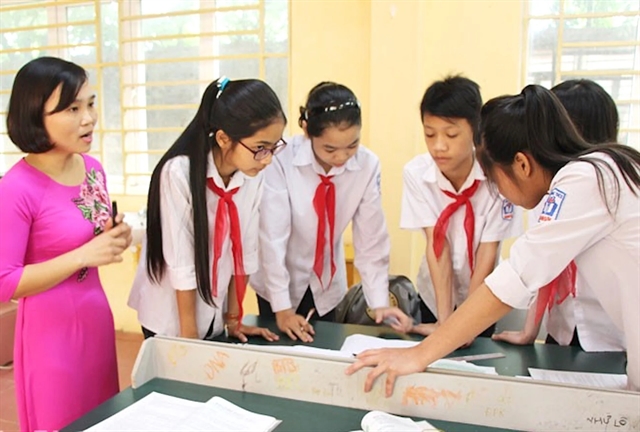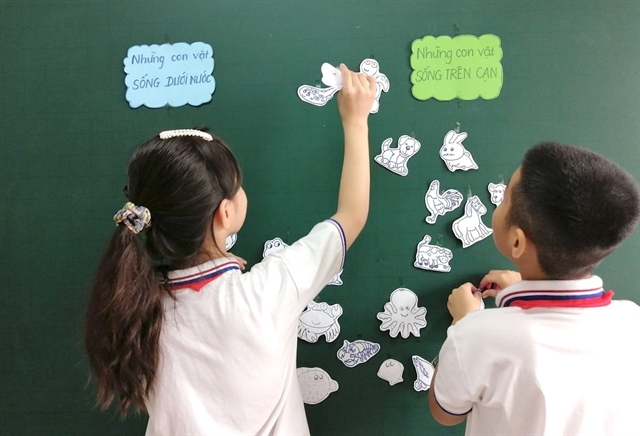 |
| Students learning a so-called "supplementary subject" in school. — Photo vtcnews.vn |
This also translates into income inequity among teachers as subjects considered 'important', like maths, English and literature, are in high demand, while teachers of subjects deemed less important, like music, physical education and civic education, are struggling with low pay.
During the final exam preparation period or summer break, when colleagues are busy teaching extra classes, 'secondary' subject teachers like Trần Thị Hoà becomes "idle", VTC News reported.
The 41-year-old teacher of a school in Vĩnh Yên District in Vĩnh Phúc Province said she wishes to teach extra classes like her colleagues to have extra income for her family and provide better learning conditions for her children.
"If only I had chosen to pursue a maths pedagogy major back then," she said.
Many maths, literature, and English teachers get most of their monthly income from teaching extra classes, ranging from a few million to hundreds of millions of đồng, while their salaries from teaching at school are not significant; some are never even used.
Meanwhile, Hoà and many other 'secondary'" subject teachers count the days until payday each month. After 18 years in the profession, her monthly salary is only VNĐ8 million (US$341).
Having been in the profession for nearly 20 years, technology teacher Trần Thị Phương Thảo, 43, is accustomed to the scene of "discrimination," where teachers of main subjects wear nice clothes and drive luxurious cars or motorbikes to school.
Meanwhile, she has used the same old Honda motorcycle since she married.
To receive a monthly salary of VNĐ10 million (US$426), in addition to teaching, Thảo also took on the position of deputy chairman of the school's Trade Union, leaving early and returning late like a routine. This meagre salary is only enough to cover the family's meals, clothing, and transportation expenses, while the rest goes for her children's tuition fees.
"Seeing colleagues taking on extra students to teach, I also longed to do so," the teacher said. "But, in reality, no one ever goes back to school to study technology. Every time I think about it, I feel bitter and have to find other things to be happy about to avoid feeling sorry for myself."
She had also applied to be a homeroom teacher to increase her responsibility allowance, but she was unsuccessful.
The school prioritises teachers of core subjects such as maths, literature, English, physics, chemistry, biology, history, and geography.
It's rare for teachers who teach technology, civic education, computer science or physical education also to be homeroom teachers.
Therefore, many teachers who teach extra classes and are homeroom teachers have become richer and can afford to buy cars and beautiful clothes and raise their children well.
Meanwhile, "supporting" teachers have become increasingly poor.
 |
| Students learning arts, a subject considered "supplementary" in school. — Photo vtcnews.vn |
Eliminating the concept of 'supplementary' subjects
According to experts, main and auxiliary subjects are one of the consequences of extra teaching and learning. The more important the subject is, the more students attend extra classes, and teachers earn more money through teaching. As for subjects that are not valued in terms of grades and exams, teachers only have their salaries and no opportunity to teach more.
Professor Đào Trọng Thi, former Chairman of the National Assembly's Youth Culture and Children Committee, believes that extra teaching and learning is the source of differentiation between main and auxiliary subjects, creating a huge income gap for teachers.
There needs to be a change in exams, grades, and student evaluations to eliminate this gap. As long as there are knowledge-heavy exams that don't emphasise skills, there will still be extra teaching and learning, main and auxiliary subjects.
An education system solely based on grades and exams will inevitably lead students to flock to extra classes in subjects required for exams.
According to Phạm Tất Dong, vice chairman of the Vietnamese Promotion of Learning Organisation, the issue of extra classes and primary and supplementary subjects won't alter as long as the first-level admission exam stays the same.
Parents feel pressured to emphasise their children's study of three courses needed to pass the exams to enter grade 10: maths, literature, and English.
This led to the creation of the primary and supplementary topics, and the maxim "study what you're tested on" was cemented into society and parents' minds.
This led to a significant emphasis on theory, the pressure of testing and examinations, and the parents' fixation with credentials and parent rankings are the causes of extra classes and additional disciplines.
Even though there is a shortage of teachers and skilled workers in society, education is not based on a foundation of real learning, real testing, and real quality.
Instead, it is based on the pursuit of virtual achievements, such as growing the number of excellent students and achieving a 100 per cent graduation rate and 100 per cent university entrance rate.
According to a report analysing the Vietnamese education sector from 2011 to 2020, published by the Việt Nam Institute of Educational Sciences and UNESCO, extra class fees are the largest expense for families of high school students today. The cost of extra classes is 32 per cent for primary school, 42 per cent for secondary school, and 43 per cent for high school.
Many parents with children in secondary school believe that the Ministry of Education and Training's proposal to exempt tuition fees for all secondary school students from the academic year 2022-2023 is a welcome signal.
However, this exemption amount is insignificant compared to the money parents spend on extra classes each year. They must pay a lot for extra classes, supplementary classes, and extracurricular clubs. — VNS